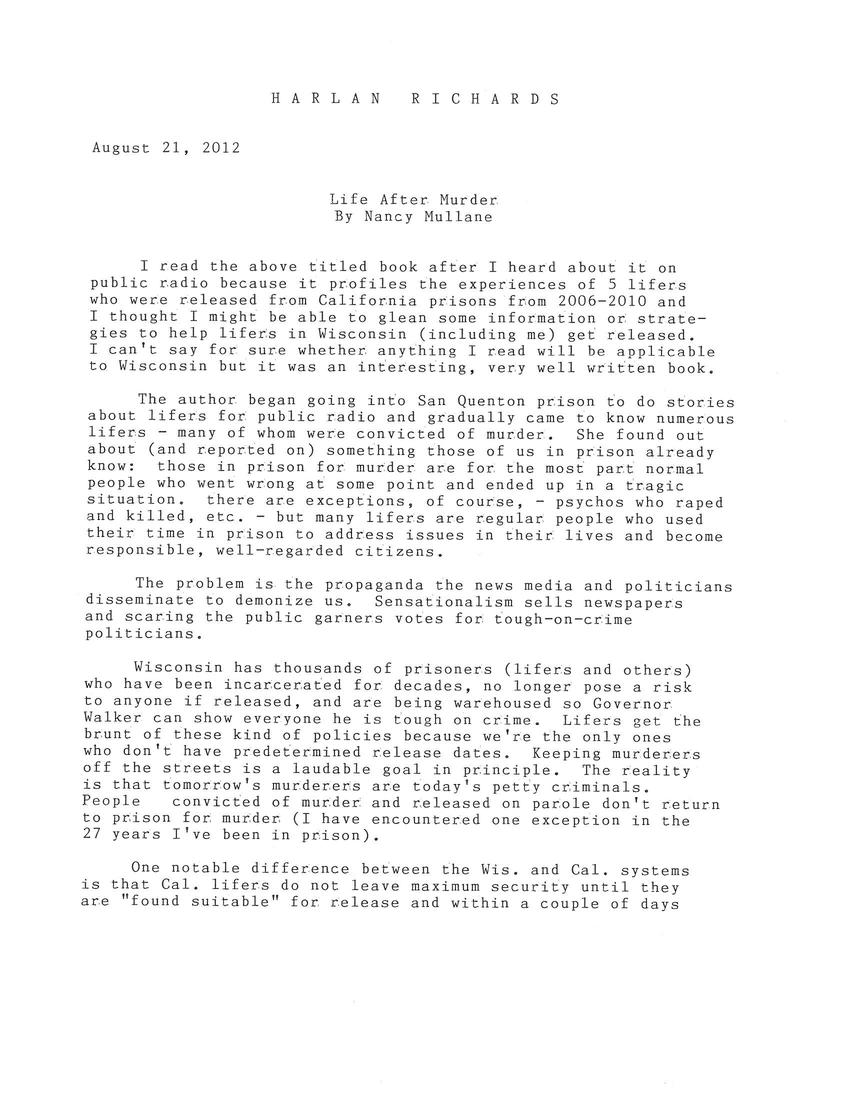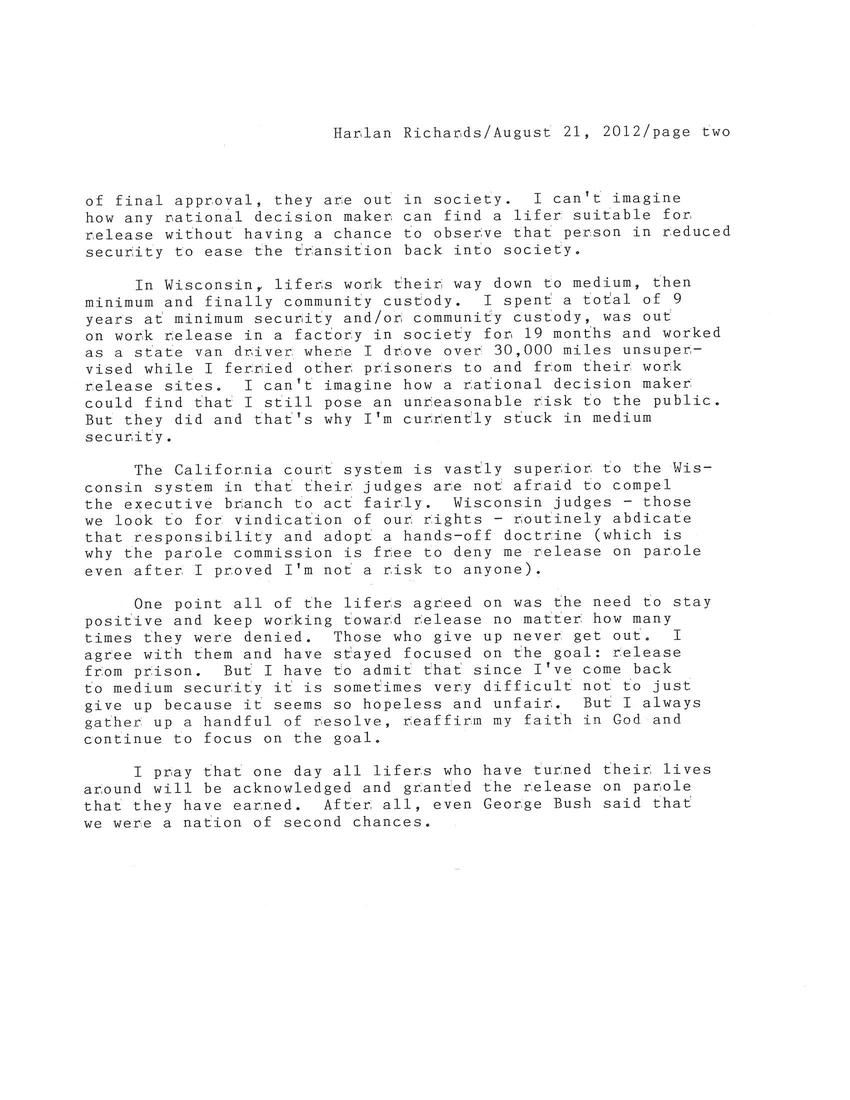
Transcription
HARLAN RICHARDS
August 21, 2012
LIFE AFTER MURDER
By Nancy Mullane
I read the above titled book after I heard about it on public radio because it profiles the experiences of 5 lifers who were released from California prisons from 2006-2010 and I thought I might be able to glean some information or strategies to help lifers in Wisconsin (including me) get released. I can't say for sure whether anything I read will be applicable to Wisconsin but it was an interesting, very well written book.
The author begain going into San Quentin prisons to do stories about lifers for public radio and gradually came to know numerous lifers – many of whom were convicted of murder. She found out about (and reported on) something those of us in prison already know: those in prison for murder are for the most part normal people who went wrong at some point and ended up in a tragic situation. There are exceptions, of course, – psychos who rapd and killed, etc. – but many lifers are regular people who used their time in prison to address issues in their lives and become responsible, well-regarded citizens.
The problem is the propaganda the news media and politicians disseminate to demonize us. Sensationalism sells newspapers and scaring the public garners votes for tough-on-crime politicians.
Wisconsin has thousands of prisoners (lifers and others) who have been incarcerated for decades, no longer pose a risk to anyone if released, and are being warehoused so Governor Walker can show everyone he is tough on crime. Lifers get the brunt of these kinds of policies because we're the only ones who don't have predetermined release dates. Keeping murderers off the streets is a laudible goal in principle. The reality is that tomorrow's murderers are today's petty criminals. People convicted of murder and released on parole don't return to prison for murder (I have encountered one exception in the 27 years I've been in prison).
One notable difference between the Wis. and Cal. systems is that Cal. lifers do not leave maximum security until they are "found suitable" for release and within a couple of days of final approval, they are out in society. I can't imagine how any rational decision maker can find a lifer suitable for release without having a chance to observe that person in reduced security to ease the transition back into society.
In Wisconsin, lifers works their way down to medium, then minimum and finally community custody. I spent a total of 9 years at minimum security and/or community custody, was out of work release in a factory in society for 19 months and worked as a state van driver where I drove over 30,000 miles unsupervised while I ferried other prisoners to and from their work release sites. I can't imagine how a rational decision maker could find that I still pose an unreasonable risk to the public. But they did and that's why I'm currently stuck in medium security.
The Californian court system is vastly superior to the Wisconsin system in that their judges are not afraid to compel the executive branch to act fairly. Wisconsin judges – those we look to for vindication of our rights – routinely abdicate that responsibility and adopt a hands-off doctrine (which is why the parole commission is free to deny me release on parole even after I proved I'm not a risk to anyone).
One point all the lifers agreed on was the need to stay positive and keep working toward release no matter how many times they were denied. Those who give up never get out. I agree with them and have stayed focused on the goal: release from prison. But I have to admit that since I've come back to medium security it is sometimes very difficult not to just give up because it seems so hopeless and unfair. But I always gather up a handful of resolve, reaffirm my faith in God and continue to focus on the goal.
I pray that one day all lifers who have turned their lives around will be acknowledged and granted the release on parole that they have earned. After all, even George Bush said that we were a nation of second chances.
Other posts by this author
|
2021 jun 25

|
2021 may 25

|
2021 apr 23

|
2021 feb 19

|
2021 feb 17

|
2021 feb 15

|
More... |



Replies (5)
I really enjoyed reading this post. I’ve only fairly recently discovered this site, so this is the first of your posts that I’ve read. I can see (with 87 posts currently on this blog site) I could have many late nights reading through the others :D
Thank you for speaking about this book. I hadn’t heard of it before but I will definitely get myself a copy. I have a very close friend serving life in Arizona so I related to a lot of the things you were saying here.
When you mentioned the problem is the propaganda, news media & politicians demonizing you, as sensationalism sells and wins votes; I agree they are certainly contributing factors, but from a more ‘outside looking in’ viewpoint, I think there are more factors at play here also. I live in Australia and our system is a lot more lenient than that of the U.S.A. a ‘Life’ term of imprisonment here is 15 years, and I think eligibility for parole is after 8 – Just think, with the time you’ve already served you could have completed THREE life terms here already & be heading into your 4th - that’s mind boggling!). Although our countries are allies & we have a strong connection with the U.S., I think we see Americans as extremists (on many levels) who don’t stop to consider the consequences of that excessive level of behavior. As I was reading this paragraph in your post I found myself thinking that I would hope future generations of decision makers will be less-extremist, and become more lenient on offering the most challenging members of our society a second chance and even encouraging a ‘fair go’. I’m not sure that is a natural progression though, sadly. My other thought was that as more and more American’s are sentenced to prison terms for longer and more prisons are continually built, surely it’s only a matter of time before EVERY person in the U.S. is touched by having a loved one residing within the prison system, and therefore may be inclined to look at the situation differently – from a more personal perspective – perhaps this will spark the sensible change in thinking that’s required there.
I took a couple of criminology classes here in Australia and my lecturer had spent some years researching in & around various U.S. prisons and your system is used as an example in our Universities as… basically, what not to do. We are told if we keep lengthening prison sentences and taking the ‘hard stand against crime’, as, yes, the media and politicians push for, and not focus on rehabilitation (which isn’t unachievable! - even without any professional assistance, as you seem to know only too well), we will end up going the same way as the U.S.A. and that’s not at all where we want to be. I don’t know if the fact that Australia started our modern identity as a penal colony, as the English sentenced criminals to deportation here in the 1800s, whether that has anything to do with the reason why we’re a bit more relaxed and don’t believe most people should be shut away without ever being given a second chance.
I know none of this information will be specifically helpful to you; I just wanted to let you know that you’d sparked some level of thought as I read through your post.
You used the phrase “rational decision maker” twice here; I would definitely suggest that there is not a lot of rationale being utilized in these decisions. How can people possibly show their level of reform if they’re never given an opportunity to? I would like to say - Lighten up America! Everyone deserves a fair go and I think, has a responsibility to contribute to society. It couldn’t be more obvious that your system is not working – your sentences are high and your crime rate high, our sentences are low and in comparison, our crime rate is low (doesn’t really take a genius to work it out does it). Of course simply reducing sentences isn’t the answer either, the whole societal structure has to be strengthened also.
Finally, I wanted to say that I read your profile before I typed my reply, just to try and get a feel for who I was speaking to and I smiled when I saw you say you were going to work on your sense of humor. For that reason I feel I must acknowledge your last sentence. I’ll elaborate a little more. When I first saw you’d mentioned George Bush I thought ‘oh no, and you had me hanging on every word up until that point’ (not a very internationally well respected man is George Bush, although our Prime Minister of that time was good mates with him :D), but then I thought about it “even George Bush said that we are a nation of second chances” and I saw the humor. I see your work there is paying off too :D
I hope you continue to find the strength to never give up your goal! Thank you for writing!
Nicki